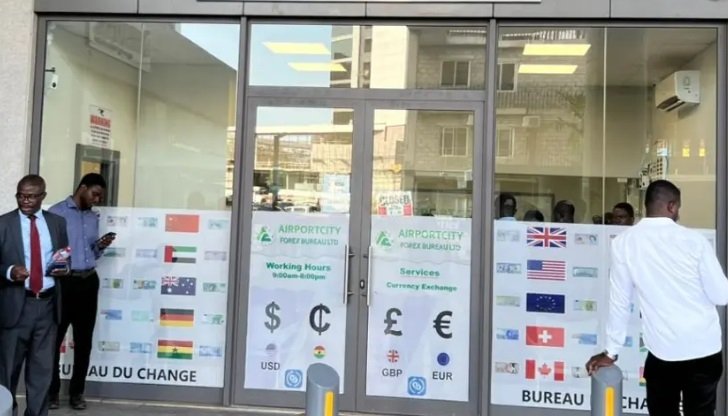The Bank of Ghana (BoG) has announced a significant increase in the biennial licence renewal fee for Foreign Exchange Bureaux (FEBs), raising it from GH¢800 to GH¢2,000.
The move, representing a 150 percent hike, takes immediate effect and forms part of the Central Bank’s broader regulatory reforms aimed at strengthening supervision and sustainability within the foreign exchange sector.
According to a statement issued by the Bank of Ghana, the revised fee structure applies to all licensed Foreign Exchange Bureaux operating across the country. The Central Bank emphasized that the decision is aligned with efforts to improve the financial integrity of the forex bureau system and ensure that operators adhere to high standards of compliance and professionalism.
The BoG explained that the revision forms part of its ongoing reforms to enhance the effectiveness of regulatory oversight over other financial institutions, including forex bureaux, microfinance institutions, and savings and loans companies.
“The revision is part of ongoing reforms to strengthen the regulatory oversight of the Bank of Ghana and to ensure the sustainability of operations in the sector,” the statement read.
This adjustment comes amid renewed efforts by the Central Bank to sanitize the foreign exchange market, improve transparency, and curb illegal currency trading activities. Over the years, the BoG has been working closely with stakeholders to ensure that only compliant and financially sound bureaux operate within Ghana’s forex ecosystem.
Enforcement of Licensing Requirements
Under the new directive, all Foreign Exchange Bureaux are required to renew their licences every two years (biennially), no later than two months before the expiry date of their current licence. This requirement, the BoG noted, is in line with Section 10 of the Foreign Exchange Act, 2006 (Act 723) and Paragraph 8 of Bank of Ghana Notice No. BG/GOV/SEC/2003/2 under the Revised Forex Bureau Regulations.
By enforcing the two-month renewal window, the BoG seeks to ensure a smoother renewal process and avoid lapses that could disrupt operations. The Central Bank urged bureau operators to comply strictly with this directive, noting that failure to do so could attract sanctions, including the suspension or revocation of licences.

The upward review has sparked discussions among forex bureau operators, with mixed reactions emerging from various quarters. While some operators view the increase as a necessary measure to enhance regulatory efficiency, others have expressed concern about the financial burden it could place on smaller operators.
An operator based in Accra, who preferred anonymity, said, “The increase is quite steep, especially for smaller bureaux with limited profit margins. We understand the need for regulatory reforms, but we hope the BoG will consider flexible payment arrangements for smaller players.”
However, others have welcomed the move, citing the need for stronger regulation and the importance of maintaining operational sustainability. “The BoG’s oversight is critical for maintaining confidence in the forex market. A higher licence fee could help fund better supervision and curb illegal operators who distort exchange rates,” another operator noted.
Ensuring Sustainability in the Forex Market
The BoG’s move to increase the renewal fee is also seen as a strategic effort to promote sustainability within Ghana’s forex bureau industry. With over 400 licensed bureaux across the country, the Central Bank aims to streamline operations and weed out inactive or non-compliant entities.
The revised fee, according to industry analysts, is likely to encourage only serious and compliant players to remain in the market, thereby improving efficiency and transparency in foreign exchange transactions. Moreover, the fee increase could provide additional resources for the BoG to enhance its monitoring capabilities, invest in digital systems, and support continuous education for forex bureau operators.
The Bank of Ghana has advised all Foreign Exchange Bureaux to contact the Licensing and Approval Office of the Other Financial Institutions Supervision Department for any further clarification regarding the new fee structure or renewal procedures.
The Central Bank also reminded operators that failure to renew licences within the stipulated timeframe may result in penalties or suspension from the official list of licensed bureaux. This reminder forms part of the BoG’s broader push to ensure that all forex bureaux operate within the legal framework governing foreign exchange transactions in Ghana.
The latest fee adjustment underscores the Central Bank’s commitment to maintaining a stable, transparent, and well-regulated financial ecosystem. In recent years, the BoG has implemented several policy reforms targeting the non-bank financial sector to enhance resilience and protect consumers.
READ ALSO:Government Urged to Fast-Track Ratification of Ewoyaa Lithium Lease























